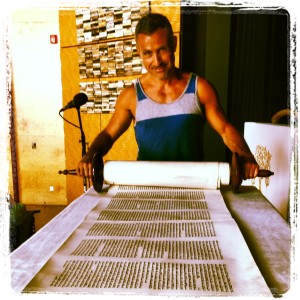Once upon a time, in a little town very far away from here, there were two neighbors. Let’s call one Shmulik, and the other Yossel. It’s hard to know who started it or why, but for years the two had been locked into battle. It wasn’t just that they didn’t like each other – they hated each other. They really had it in for each other.
If Shmulik had a good barley harvest, Yossel told the rest of the village that the barley was infested with rot and that they shouldn’t buy it from him. If Yossel had a good grape harvest, Shmulik told the villagers that the grapes were so acidic they were not worth tasting. When Shmulik tried to sell some of his acres of land so that he could provide a dowry for his oldest daughter, Yossel told people that the land was haunted by demons and that no one should live there. When Yossel’s ox fell on the side of the road and broke his leg, Shmulik told everyone in the market that it was because Yossel mistreated his animals.
Things got worse and worse between the two of them. The accusations flew back and forth, back and forth. The villagers didn’t know what to think. They didn’t know who was right and who was wrong and what was what with these two, and so more and more, not wanting trouble or bad luck, they just stayed away from them both.
Finally, one morning, just as Rosh HaShanah was approaching, Shmulik sat up in bed and said to his husband Chaim Yankel, “This craziness has to stop. I can’t go on. When I go to market, no one wants to talk to me any more. No one wants to buy from me, or sell to me. I don’t even remember why I’m so mad at Yossel, but when I see him, I just start to burn up.”
Chaim Yankel nodded. “It is time to stop,” he agreed. “But how will you do it?”
Shmulik shook his head. “I don’t know. But this can’t keep going. Every day I have a headache, I have a terrible rash, and my ulcer is acting up. I’m a nervous wreck. If this goes on any longer I won’t have any friends left, and we won’t have any more shekels to our name. Plus, the high holy days are coming. It’s time to put an end to this nonsense.”
“You know what you need to do,” said Chaim Yankel. And Shmulik nodded his head, for indeed he did. He got up out of bed, and headed to the rabbi’s house.
Shmulik explained the situation to the rabbi and poured out his heart. The rabbi nodded and paced back and forth, thinking. Finally, the rabbi got a ladder, climbed up and pulled down a big book from one of the highest shelves.
“Hmmm,” the rabbi murmured. “Ah, yes, here it is.” She looked up at Shmulik and smiled. “Our tradition teaches: If others speak ill of you, let the worst they say seem to you small. If you speak ill of others, let a small thing seem to you big (BT Derek Eretz Zutta 1:6). Do you understand, Shmulik?”
Shmulik thought about it. “Yes, I think so. Make little of the terrible things Yossel says about me, even though they hurt me. And take responsibility not to be someone who speaks badly of him in return.”
“Right.” The rabbi nodded. “Exactly. And then the text continues: Go apologize to the person of whom you have spoken ill. That is how the cycle will truly be broken.”
Shmulik shrugged. “But what if he doesn’t apologize to me?”
“You have no control over his behavior, only over your own. That is the point. He will do what he will do and so be it. But you do have control over your actions – make sure you do the right thing and do your part to put an end to this.”
“Ok,” Shmulik said. “I don’t think this will work, but I’m willing to give it a try.” And he started on his way home.
Meanwhile, in a different house in the village, Yossel too had woken up with the headache. He too had declared, this has to stop. This has gone too far! And he too set out to see the rabbi. But he took a different path, so that just as Shmulik had left the rabbi’s house, Yossel was approaching it from the other direction, and they did not see each other.
“Rabbi,” Yossel implored. “I need your help.” And he explained the situation at length.
The rabbi thought about it, and paced back and forth, and climbed onto the ladder to pull a big book off of a high shelf. She searched through the book and finally found what she was seeking. “Here it is,” she said. “The midrash teaches: If someone has received an injury, then, even if the wrongdoer has not asked forgiveness from the one who was wronged, the receiver of the injury must nevertheless ask God to show the wrongdoer compassion, even as Abraham prayed to God for Abimelech (Genesis 20:17) and Job prayed for his friends (Job 40:10).” The rabbi paused. “And then Rabbi Gamaliel said about this: Let this be a sign to you, that whenever you are compassionate, the Compassionate One will have compassion upon you (BT Baba Kamma, 9:29-30). Do you understand, Yossel?”
Yossel thought for a moment. “So I’m supposed to ask God to be compassionate toward Shmulik, regardless of how he’s treated me, and even if he hasn’t come to ask me for forgiveness?”
“Yes, exactly,” said the rabbi, smiling. “Though you should try to ask for forgiveness as well. That is how the cycle will truly be broken.”
So Yossel nodded and went on his way home.
Much to their great surprise, later that afternoon the two men found each other on the road between their two houses. Shmulik was carrying a chicken, and Yossel was carrying a basket of apples.
Yossel took one look at Shmulik and let out a shriek. “What have you done?!” he yelled. “You’ve brought me one of your sick chickens, to poison me and my family, is that it? Do you want to infect my whole flock? Are you crazy or just evil? Leave right now, and take your sick chicken with you!”
“And you!” Shmulik screamed. “What disease-ridden waste do you have hidden in that basket, what leftover that you couldn’t sell in the market and won’t even feed to your own livestock – better that you should throw it at me?”
Suddenly both men looked at each, and looked at the items in their hands, and become very quiet. Both started to speak at the same time.
“I’m sorry—” said Shmulik.
“I’m sorry too,” said Yossel.
“I’ve come to make peace,” Shmulik said, holding out the chicken.
“As have I,” said Yossel, holding out the basket of apples.
After a few moments of looking at each other, Shmulik said, “Well, what do we do now?”
Yossel shrugged. “I guess I have a tasty chicken dinner, and you have some delicious apples.”
“I guess so. And maybe we can stop all this fighting?”
“Maybe, but it will be hard.”
“Yes, it will be. Very hard.”
And now Yossel shrugged. “We can try.”
“Yes, we can.”
“I forgive you and wish you well.”
“Thank you, and I, you.”
So they shook with their free hands, and each man went back to his home with a gift in his hands, and a gift in his heart.



